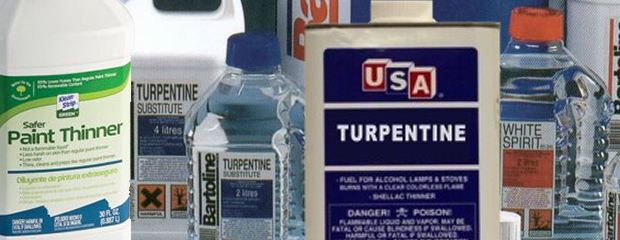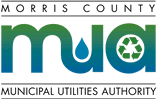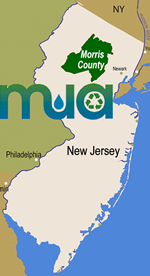Transfer Station Info (Tip Fee $113.00/ton)
- Mt. Olive Mon-Fri 7:30am-3pm; Sat 7:30am-11am
- Parsippany Mon-Fri 7am-3pm; Sat 7:30am-11am
- No Rental Trucks
- Payment by Account, Check, Credit Card. No Cash

Morris County
Municipal Utilties Authority
Join
3/6/26, 11AM MCMUA Bid Opening #2026-SW01 - 3 SELF CONTAINED COMPACTING UNITS
Join via Webex
or use the call in number: 408-418-9388 with Access code: 2348 996 4225.
Click to go to Notice/Bids Page

F.A.Q. Solvents
The MCMUA operates one of NJ's most comprehensive household hazardous waste (HHW) programs. This F.A.Q. page and information on hazardous materials is intended as a guide about HHW materials as well as the MCMUA's HHW program. This information is a general guide and does not constitute official rule, regulation or law.
Hazardous Waste Materials
- Adhesives
- Aerosols
- Antifreeze
- Appliances (CFCs)
- Art & Crafts
- Asbestos
- Batteries (Auto & Boat)
- Batteries, Household (dry cell)
- Cell Phones
- Compressed Gas Cylinders
- Driveway Sealer
- Electronics
- Fire Extinguishers
- Fluorescents
- Gasoline
- Medical Waste
- Kerosene
- Mercury
- Motor Oil & Filters
- Muriatic Acid (HCl)
- Paints & Stains
- Pesticides
- Photo Chemicals
- Pool Chemicals
- Propane
- Rock Salt
- Smoke Detectors
- Solvents
- Wood with Lead Paint
Hazards
- Thinners and solvents contain volatile organic compounds (VOCs)
- Thinners and solvents can be absorbed through the skin.
- Thinners and solvents are flammable.
-
Some solvents are carcinogenic.
Handling
- Keep thinners and solvents in closed and labeled glass or metal containers. Some plastic containers may deteriorate in contact with solvent.
- Store thinners and solvents away from sources of sparks or heat.
-
Do NOT put leftover product in the trash or down the drain.
Management Options
- If product is unused, try to give it away to someone else who can use it.
- If the product cannot be given away for reuse, and the municipal paint collection program accepts it, take it there.
- Solvents mixed with paint may be reused. First, let solids settle out and pour off liquids for future use as a solvent. Label container clearly.
- The solids may be disposed of wet at an HHW collection. Alternatively the solids may be dried out by adding absorbents such as kitty litter or vermiculite, in a well ventilated area, away from ignition sources such as appliances with a motor or pilot light and out of reach of children and pets. Dried solids can be disposed of in the trash.
- Small amounts of used or new paint thinner can be added into oil-based paint. Add to same color paint as that used with the thinner.
-
If the thinner or solvent cannot be reused through the above options, save for the next HHW collection day or take to a commercial hazardous waste facility.

